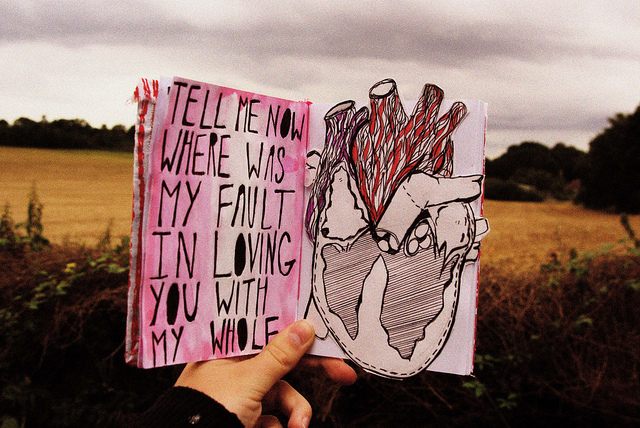In recent months, it feels like our society has divided itself into two sides screaming at one another: “more love” versus “no more tolerance for (insert any controversial issue here).”
What is it about acceptance and respect that has some people so afraid to want more kindness circulated in the world?
It has me questioning why love, especially the unconditional kind, seems so damn hard to give.
“Unconditional” is a word used in meaningful times, but often forgotten in the daily grind. My own connection to the word is slippery at best, and I actually take the time to consider this word, often. Without conditions, without restraints or terms, not limited, complete, absolute. How many people do we love like that in our lives? Three? How about a dozen? Everyone? What is it about these terms and conditions that make them so important they must be present to show and give our love freely?
Maybe people don’t know how. Maybe knowing that not everyone gives or receives love in the same way confuses people. Maybe people don’t know that reciprocity is not always getting love returned in exactly the way we give it; I don’t only love the people I think are most likely to return my exact expression of affection. Or maybe people have been damaged into believing that in order to give of themselves, they need a guarantee of something in return first. Maybe they believe the world has been unfair to them, and they cannot fathom an unconditional type of arrangement at all, let alone in giving love, adoration, passion, or pride. These people are hard to love, and even harder to squeeze love out of.
And yet there are those whom we can love whole-heartedly, over and over again, despite injury or recklessness to us. My tantrum-ing child can scream as much as he likes and cry a gut-wrenching sign of disapproval toward me and I have not stopped loving him for a mere millisecond.
We forgive some hearts so readily, and for others we hold grudges for a lifetime.
There is a clear divide in the way we are able to love some, and the way we love (or withhold love from) others. In large groups, in our own homes, this is true.
I wonder, though, can anyone feel a light inside them when they express kindness? Does that kindness and concern, that apology or that smile, actually come from a place that finds true joy in giving? Or is it that most people can only give from a place of necessity, obligation, or determination for another purpose?
In light of recent vocal divides of our society’s morals, I find more and more that I look for people with whom to connect; who seek eye contact or a moment for a common bond. Whether it’s a person we notice in passing or a beloved soul in our life, if we look around, people are seeking love everywhere.
I know, I wear rose-colored glasses. I look for the best in people. I wish for people to be good and therefore I believe that they are. I trust people, that they are capable of change and I believe that people can step into roles of great responsibility. I want everyone to want kindness and compassion because it makes sense to live in a world where that is our primary value.
But as a human race, we have always been capable of love, because our souls have told us that the skeleton of our societal success has always been community, kindness, acceptance, reciprocity, respect, and most importantly love, without a price tag.
Couldn’t it be absolutely possible for our hearts to be so forgiving and unlimited that we can wish even our most exhausting enemy well? Couldn’t we send someone off who broke our hearts with the love we had to give them and just walk away carrying what’s left of theirs around with us?
Why is love so conditional for so many of us? There is a true freedom to giving of ourselves without a need for something in return. Like walking away stark naked and proud as a peacock from a wreck that should have killed us, it means complete freedom: to love as much as we like without limit, to love without a gnawing need, greed, or festering seed in our heart anywhere.
“I just love you, that’s all. No because. No until. No unless. I just love you.”
It’s fear of rejection for some that stops us. Loving unconditionally in our lives exposes a vulnerability, raw and right over our hearts, and it seems to singe at the thought, “What if I get hurt?” It’s a valid question. But the answer is finding courage not to mind if we do. We can give love anyway, not contingent upon a guarantee of anything. The fear of rejection or disappointment is nullified.
If we just give love, even if we are rejected, we did our part, by loving, not expecting anything in return, unconditionally.
This is an incredibly difficult thing to expose in ourselves. We want to keep up a guard, we want to maintain a safe distance from anyone who can break us, or who threatens our view of the world. But this limits our hearts to only being able to love under certain conditions, to only love certain kinds of people. If we tear down the wall we have built around our hearts, that limits who gets in, or how much we allow to flow out, we can understand that love is not something that needs anything to survive. It can be given over and over and over again without needing anything, not our approval, not reciprocity, not gifts, not even love in return, to keep giving. And that feels so, so good.
Unconditional love.
Unconditional fairness, faith, kindness, generosity, selflessness.
Oh, wouldn’t the world be such a beautiful place if it wasn’t so damn hard to need?
Author: Toni-Ann Yates
Image: emilyrachelmartin/Flickr
Editors: Emily Bartran; Travis May







Read 1 comment and reply